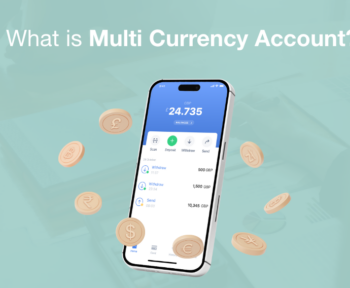The foundation of digital finance is the idea of cryptocurrency storage. It stands for the accountability and independence of handling one’s own finances independently of banks or other middlemen. You can store your own crypto.
Cryptocurrencies only exist in digital form, whereas conventional money is kept in safes or bank accounts. Cryptographic keys, which are unique digital codes that verify ownership and permit transactions on the blockchain, protect them.
These keys must be stored properly to avoid theft, loss, or unwanted access. To put it briefly, in a decentralized world, understanding how to securely store your cryptocurrency is what distinguishes ownership from risk.
Understanding storage practices becomes essential to financial literacy as the use of digital assets grows. The more you know about crypto security, the more equipped you are to take part in the financial future with assurance. Let’s start to dive into the details!
What Is Cryptocurrency Storage?
The process of protecting and overseeing digital assets such as Bitcoin, Ethereum, or stablecoins is known as cryptocurrency storage. Storage entails protecting access to private and public keys because cryptocurrencies don’t exist in physical form.
The public key serves as your wallet address, enabling people to send money to you, while the private key serves as a password, providing complete control over your assets.
Cryptocurrency can be stored in a variety of ways, including offline hardware devices and online apps. Convenience and security are balanced differently in each option.
Online wallets are frequently preferred by users who value speed, while offline solutions are used by those who want the highest level of security. Keeping exclusive control of your private keys is the fundamental idea behind any approach.
Planning for backup and recovery is another aspect of storing cryptocurrencies properly. Funds may be permanently lost if a wallet or private key is lost. An additional degree of security is thus added by keeping recovery phrases in several safe physical locations. To prevent physical harm, many users decide to keep these recovery codes in fireproof safes or sealed envelopes.
Why Does Crypto Need Storage?
Cryptocurrencies are decentralized and unrecoverable once lost, in contrast to fiat money. As a result, crypto storage is among the most important elements of ownership.
Each digital currency you own is linked to a blockchain address, and the only way to establish control is with your private key. Your assets can be transferred right away without any chance of reversal if that key is stolen.
Data breaches, malware, and phishing attacks are examples of security threats. In order to obtain private keys, hackers frequently target online wallets and exchanges. Owners must therefore know which storage options best suit their needs, regardless of whether they trade frequently or hold assets for a long time.
Digital and physical security measures are both part of good storage practices. Risk can be decreased by using encrypted devices, enabling two-factor authentication, and storing backups offline.
Spreading money across several wallets provides an additional degree of security for businesses or professional traders. Furthermore, patching vulnerabilities in wallet software on a regular basis helps stop hackers from taking advantage of them.
In summary, storing cryptocurrency involves more than just protecting your assets; it also entails accepting full responsibility for them. Being in charge without depending on centralized systems is what is meant by true ownership.
With Jeton, your reliable financial partner, learn how easy it is to handle safe online transactions.
Types of Cryptographic Storage
Each of the three types of cryptocurrency storage options offers a different degree of accessibility, convenience, and security. Understanding the distinctions between these choices enables users to manage their digital assets with a balance between protection and flexibility.
Crypto Exchange
Users can purchase, sell, and store cryptocurrencies on a crypto exchange, an online marketplace. Your money is kept in managed wallets by these exchanges, which serve as middlemen.
Despite their convenience, hackers frequently target them because they store a lot of cryptocurrency in one location. Principal benefits and drawbacks of crypto exchanges:
- Benefits include integrated payment services, quick access to trading tools, and simplicity of setup. Exchanges make it easier for newcomers to enter the cryptocurrency market.
- Drawbacks include reliance on outside security, withdrawal restrictions, and susceptibility to cyberattacks. User funds may be at risk in the event that an exchange is compromised.
Exchanges work best for crypto traders who are active and move money around a lot. Withdrawing funds to personal wallets, however, is advised for long-term investors in order to have more control.
An additional degree of security is provided by using trustworthy exchanges that follow stringent security procedures. In the event of theft, some exchanges even provide limited coverage through insurance policies for digital assets.

Hot Crypto Wallet
A digital wallet that stays online is called a hot wallet. It is usually utilized with desktop software, mobile apps, or web browsers and enables fast transfers.
Hot wallets are ideal for regular transactions, but because they are constantly exposed online, they need to be properly secured. Important characteristics of hot wallets:
- Benefits include compatibility with the majority of cryptocurrencies, instant access, and a seamless user experience. Excellent for traders and people who make daily payments with cryptocurrency.
- Risks include that hot wallets are more susceptible to malware, phishing, and hacking attacks when they are constantly connected to the internet.
Small, frequently used amounts of cryptocurrency are best stored in hot wallets. Risks can be decreased by implementing several security measures, such as biometric verification and strong passwords.
For two-step security, some users pair hot wallets with hardware devices. Monitoring wallet activity logs on a regular basis can also aid in the early detection of suspicious activity.
Cold Storage
The safest way to store cryptocurrency for an extended period of time is with cold storage. It protects assets from the majority of cyberthreats by keeping them completely offline and unconnected to the internet.
Air-gapped computers, paper wallets, and hardware wallets are typical examples. Principal benefits of cold storage:
- Cold wallets are very difficult to remotely hack because they are offline.
- For investors who intend to hold assets for months or years without frequent access, long-term safety is ideal.
- Without depending on outside custodians, users keep direct control of their private keys.
However, because users have to import keys or reconnect devices in order to make transactions, cold storage is less practical for speedy transfers.
Cold storage is still the best option for protecting assets for fund managers, institutional investors, and private citizens who own sizable quantities of cryptocurrency. Long-term security is ensured by properly labeling, encrypting, and storing recovery keys.
The risk of complete loss can be further reduced by spreading out storage techniques among paper backups and hardware. To achieve the perfect mix of clarity, speed, and compliance in managing your assets, experience Jeton, the trusted bridge between traditional and digital finance.
How Do You Compare the Types of Cryptocurrency Storage?
Convenience and security should be balanced when assessing cryptocurrency storage. While some solutions concentrate on protecting assets from online threats, others give priority to speedy access.
Users are better able to make decisions when they are aware of the trade-offs. You can determine which of the primary storage options best suits your needs by comparing them side by side.
The primary types of crypto storage are compared as follows:
- Crypto Exchange: It is best suited for regular traders who require instant access to buying and selling, but because exchanges hold private keys, there are greater security risks. For security, users depend on the exchange’s procedures and guidelines.
- Hot Wallet: It is perfect for daily use, this device offers speed and flexibility, but because of its continuous online exposure, it necessitates robust cybersecurity measures. Avoid using unreliable browser extensions, and always double-check the wallet’s sources.
- Cold Storage: It is designed for long-term investors who want to keep their assets totally offline for the highest level of protection. For people who prioritize safety over accessibility, it’s ideal.
Each approach has a distinct function based on the objectives and behavior of the user. The best strategy for most people is a combination of keeping the majority in cold storage and using a small portion in a hot wallet for convenience. This hybrid approach provides peace of mind and flexibility. Another way to reduce risk is to learn how to move money between different types of storage.
Should I Keep My Crypto on an Exchange or Wallet?
Trading on a cryptocurrency exchange is convenient, but it requires you to trust the platform with your private keys. Exchanges may be subject to technical malfunctions, regulatory actions, or hacking.
On the other hand, keeping your cryptocurrency in a personal wallet allows you complete control but necessitates greater accountability and awareness.
Exchanges offer immediate access to markets and liquidity for small, active trading amounts. Transferring money to a hot wallet or cold storage wallet, however, guarantees greater security for long-term savings.
Over time, exchanges have strengthened their security measures, but no centralized platform can completely ensure the safety of digital assets.
Always confirm if an exchange employs stringent withdrawal verification, insurance, and multi-signature protection. For serious investors, self-custody is still the best option even in that case.
Keeping your keys entails keeping your cryptocurrency. The secret to wise crypto management is to learn how to strike a balance between independence and convenience.
Jeton closes the gap between traditional and digital finance while maintaining the security and accessibility of your funds, offering seamless and legal international payments.

What Is the Safest Way to Store Crypto?
Offline, or cold storage, is the safest version of crypto storage. By separating private keys from the internet, these solutions shield assets from malware, hackers, and illegal access. Paper wallets and hardware wallets kept in secure locations are two examples.
The primary advantages of cold storage:
- Protection offline: impervious to phishing attempts, scams, and online attacks.
- Long-term dependability: Ideal for holding sizable sums of cryptocurrency over several months or years.
- User ownership: Without relying on a third party, you maintain total control over private keys.
Although cold storage offers the best protection, it necessitates self-control. In the event of a hardware failure, owners must keep backups and safely store recovery phrases. Even in an emergency, continuity is ensured by keeping copies in various physical locations.
Using safety deposit boxes or tamper-proof seals gives an additional degree of security for people who are in charge of big portfolios. To put it briefly, your personal security plan determines how safe your cryptocurrency is.
What Is the Best Way to Store Your Own Crypto?
Your risk tolerance and asset usage will determine the best way to store cryptocurrencies. While long-term holders depend on cold storage for optimal security, traders might favor hot wallets for speedy transactions. But combining these approaches results in a strong, adaptable plan that satisfies both requirements.
Important elements of a successful crypto storage strategy:
- Make use of multiple security layers: For each wallet, enable biometrics, two-factor authentication, and strong, one-of-a-kind passwords.
- Backup phrases for recovery: Store backups on several offline devices, like encrypted drives or safes.
- Increase the variety of storage techniques: To avoid complete loss in the event that one wallet is compromised, divide your assets between the hot and cold wallets.
Along with these precautions, keeping abreast of security developments aids in defending against changing threats. Protection is further improved by using trusted wallets with open-source code and credible security audits.
Advanced users can reduce single-point risk by using multisignature setups, which offer shared control between devices or individuals. This proactive strategy increases adaptability in a dynamic environment.
Discover cutting-edge financial tools and safe online payments with Jeton, which empowers users worldwide with each transaction’s clarity, speed, and compliance both with fiat money and cryptocurrencies.
Which Way Is More Suitable for You?
Your lifestyle, level of experience, and goal will all influence your choice of cryptocurrency storage. Speed and accessibility are advantageous to active traders, but offline options are preferred by investors who value long-term security.
Finding the ideal balance between convenience and security requires evaluating your needs. Start small if you’re new to cryptocurrency; use trustworthy wallets or exchanges and educate yourself on security procedures.
Make the switch to cold storage as your portfolio expands for improved control. As risks and technology change, review and update your storage strategy on a regular basis. To make sure you can recover money if necessary, think about periodically testing backup procedures.
To put it briefly, good crypto management blends responsibility and awareness. Your financial independence is strengthened by every choice you make, including where to store, how to protect, and when to update.
You can protect your assets and guarantee peace of mind for years to come by taking the time to learn about your options now. Crypto storage is about creating enduring habits that safeguard your wealth in a digital future, not just about technology.
Wrapping Up
Storing your own crypto is all about control, security, and independence — and Jeton gives you all three in one simple ecosystem. With Jeton Wallet, you can manage your digital assets with advanced security, smooth crypto conversions, and seamless access no matter where you are.
And when you want to bring that convenience into your everyday spending, the Jeton Card makes it possible to use your balance online or in-store with zero friction. If you’re ready to take full ownership of your crypto journey, Jeton is your safest and smartest companion.
Secure storage, global payments, fast transfers.
Take control of your digital assets today:
- Open your Jeton Wallet and store crypto securely
- Order your Jeton Card for effortless global spending
- Download the Jeton App via the App Store or Google Play and keep your money and crypto in one powerful place
Your crypto. Your rules. Your Jeton. Sign up now!


